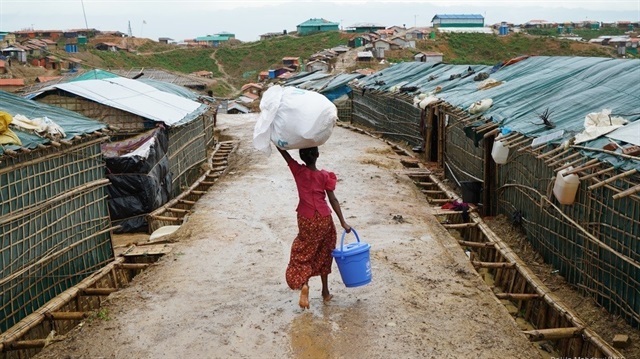
Experts worry global terrorist groups like Daesh may take advantage of vulnerable Rohingya communities
Global powers must adopt a more humanitarian approach toward resolving the Rohingya crisis, experts urged.
In an exclusive interview with Anadolu Agency, S.M. Rashed Ahmed, a former Bangladeshi diplomat, stressed that Asian giant China should break its silence on the issue.
The latest UN Fact-Finding Mission on Myanmar has found the country's military guilty of genocide and crimes against humanity including rape, gang rape, sexual slavery, forced nudity, mutilations torture, persecution, and enslavement.
The mission also recommended an investigation and prosecution of top military commanders.
The report said it found conclusive evidence that the crackdown of the Myanmar army -- known as the Tatmadaw – “undoubtedly amounted to the gravest crimes under international law” in Rakhine state as well as in Kachin and Shan states.
Ahmed, a former UN Regional Administrator in Kosovo and former Bangladeshi ambassador to Japan, said that the clampdown in Rakhine state is “highly alarming”.
“Just imagine, if every state wishes to establish a purely Buddhist state or a purely Islamic state or a purely Hindu state or a purely Jewish state or a purely Christian state, what will be the consequence of it? This is like Nazism of Germany’s Hitler,” he said.
- Chinese role
Urging for an effective solution to the Rohingya crisis, Ahmed stated that China has an important role to play.
He said relations between China and Myanmar are very strong and mutually beneficial.
Chinese state-owned firms have recently reached agreements with Myanmar to construct a $7.3 billion deep-sea port and $2.7 billion industrial area in a special economic zone at Kyaukpyu along the coast of the Bay of Bengal.
Ahmed said that China has a huge interest in Myanmar, as it needs oil and other resources that can reach China through Myanmar.
However, he added, China should not tolerate the gross human rights violations by Myanmar.
As an Asian neighbor the Bangladeshi people are disappointed at China for its silence on the Rohingya genocide, he said.
“We expect China, as a superpower, to act more responsibly [and] not to go for bread and butter all the time,” he added.
- Global perception of Buddhism
The global attention to issues related to the rise of terrorist groups such as Daesh, put the Rohingya issue on the back-burner.
“The worldwide perception was that Buddhists are peace-loving and the country is moving to democracy under a great leader like Suu Kyi,” he added.
There is growing criticism of Myanmar's de facto leader and nobel laureate Aung San Suu Kyi for her silence on the Rohingya crisis brewing under the patronage of a powerful military.
Ahmed urged for immediate action to stop genocide in Myanmar for the greater interest of global peace and security.
He said groups like Daesh may take advantage of the displaced refugees who have no place to turn to.
“Then what will be the result of it? More than one million Rohingya along with 170 million Bangladeshis will be the victims of it. Is it logical that neighboring big powers like China and India will not be affected by it?” he added.
Maimul Ahsan Khan, professor of law at the University of Dhaka and former country specialist on Afghanistan for Amnesty International, said that a joint pressure on China is needed.
Khan added that Bangladesh, along with other countries, should put diplomatic pressure on China to deal with the Rohingya crisis.
Azeem Ibrahim, a scholar of the University of Cambridge, in his research paper titled: “The Rohingyas: Inside Myanmar’s Hidden Genocide” published in 2015 by Hurst and Company, London, warned of genocide.
“The UN has been warned repeatedly as to how bad the situation is and indeed it has continued to publish highly critical reports. But, as ever, its impact is limited, in part by the enduring politics of the Security Council, in this case, it is most likely that China and Russia would back the Myanmar military, and also by the fact that it has multiple roles in Myanmar,” he wrote.
Ibrahim also analyzed China’s role in Myanmar.
“It is unlikely that China would pressure Myanmar over the wider issue of democratic reforms, but it might be less tolerant if unrest in Rakhine threatened its vital infrastructure projects,” he said.
- Nearly 24,000 Rohingya killed
In a report, the UN refugee agency said nearly 170,000 Rohingya fled Myanmar in 2012 alone.
Since Aug. 25, 2017, nearly 24,000 Rohingya Muslims have been killed by Myanmar’s state forces, according to the Ontario International Development Agency (OIDA).
In a recent report, Forced Migration of Rohingya; The Untold Experience, the OIDA raised the estimated number of murdered Rohingya to 23,962 (± 881) from a Doctors Without Borders figure of 9,400.
More than 34,000 Rohingya were also thrown into fires, while over 114,000 others were beaten, the OIDA report said, adding that 17,718 (±780) Rohingya women and girls were raped by Myanmar’s army and police. Over 115,000 Rohingya houses were also burned down and 113,000 others vandalized, it added.
According to Amnesty International, more than 750,000 Rohingya refugees, mostly children and women, have fled Myanmar and crossed into Bangladesh after Myanmar forces launched a crackdown on the minority Muslim community.
The Rohingya, described by the UN as the world's most persecuted people, have faced heightened fears of attack since dozens were killed in communal violence in 2012.
The UN has documented mass gang rapes, killings -- including of infants and young children -- brutal beatings, and disappearances committed by Myanmar state forces. In a report, UN investigators said such violations may have constituted crimes against humanity.
*Meryem Goktas from Ankara contributed to this story.








